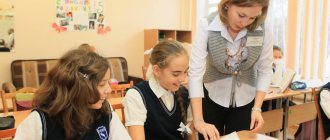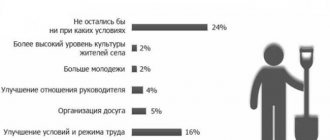Who is eligible?
Social and material support is provided to rural residents at the country level as a whole and in accordance with regional legislation. The latter often becomes an additional bonus for a person working in the village. However, simply living in a rural area is not enough to qualify for a benefit. The following are entitled to various benefits:
- employees of the pedagogical sphere (teachers, educators);
- medical employees;
- social workers;
- cultural workers;
- farmers with peasant farms.
However, to receive preferences, a number of conditions must be met. Thus, Russians who permanently live in rural areas are eligible for support (exceptions are possible for teachers - they do not have to live here, but then the list of benefits will be smaller).
Increasing pensions for rural pensioners in 2021 (latest news)
If unforeseen circumstances occur that significantly affect the pensioner’s budget, he has the right to apply to the social protection authorities for one-time or regular financial assistance in cash and in kind (clothing, shoes, food, firewood, coal, hygiene products, medical devices, etc. ).
Social support for pensioners in rural areas
Regional authorities, in turn, may limit the receipt of benefits for vehicles with an engine of a certain power, cars with special technical characteristics, luxury cars, etc. Or, instead of a complete tax exemption, only a 50% discount is established.
- The most noticeable and largest benefit is a 100% discount on utility bills. In other words: rural teachers may not pay for water, electricity, heating and fuel.
- Not only the teacher, but also all members of his family receive a discount on utility bills. It is worth noting that when a teacher retires, the benefit system does not cease to exist.
Cash payments
Specific cash payments for agricultural workers are rare. However, they can be expressed in the following forms:
- additional payments to wages or establishing a minimum salary for a specific position, based on the cost of living or the average salary in the region;
- grants.
The latter are especially common among farmers who want to develop their own farms.
The amount of the subsidy can reach 40,000,000 rubles, however, the person is not given the money for the entire time - within 5–15 years he will have to return it. In essence, this is preferential lending to businessmen involved in agriculture. Monetary incentives are also found among social workers. But to receive them you will have to win a government competition in one of the categories or become a prize-winner. The payment amounts here are also significant: 200,000–500,000 rubles.
Non-working pensioners who have worked in the agricultural sector for over 30 years can count on an additional increase in their pension. According to December 28, 2013, the surcharge for them is 25%. It applies to the fixed part of the payment, which from January 1, 2021 is equal to 6,044.48 rubles. Therefore, the amount of the increase is RUB 1,511.12. When calculating “rural” experience, not all specialties are taken into account, but only those listed in Decree of the Government of the Russian Federation No. 1440 of November 29, 2018. These, for example, include: the head of a peasant farm, a mechanic for repairing agricultural machines, laboratory assistants, etc. In general, these are specialties related to the fields of crop production, livestock farming, and fishing.
Link to document:
What are the benefits for rural pensioners in 2021 (latest news)
Early leave is not the only benefit for rural teachers. Regardless of whether the teacher continues to work at school after retirement, he is entitled to a number of additional social assistance measures - utility services:
Payment of housing and communal services to teachers in rural areas in 2021
You can determine in which year teachers and pedagogues will be able to receive early retirement, depending on the year of acquisition of special teaching experience, using the table below:
The honorary title “Honored Teacher” is awarded on the basis of Decree of the President of the Russian Federation dated September 7, 2010 N 1099 for personal merits in teaching, training winners of Olympiads at various levels, retraining or training of teaching staff. As a rule, such status is given no earlier than 20 years from the start of teaching activity.
You may be interested in:: Cost of living in St. Petersburg 2021 for child benefits
Labor benefits
Labor preferences for a working person play an important role. So, for those living in rural areas they are as follows:
- the possibility of retraining, the need for which arose as a result of changes in working conditions, without additional personal expenses;
- establishing monthly payments equal to 1 minimum wage for the period of forced unemployment (for example, if a school is closed and the teacher simply has nowhere to work).
Even in Soviet times, most agricultural work, including physically difficult work, was performed by women. At the same time, expanded labor benefits were provided for them (from November 1, 1990). Many points of this regulatory act are still valid, but with some changes prescribed in the Labor Code of the Russian Federation. The most important ones look like this (true for women working in rural areas):
- reduction of the working week to 36 hours while maintaining the wage rate (if more hours are worked, the excess hours are paid as overtime);
- the possibility of receiving an additional day off without saving a salary once a month at the request of a woman (paragraph 2 of Article 262 of the Labor Code of the Russian Federation).
For teaching staff, other formats of labor benefits are established if they work in rural schools. The preferences look like this:
- the working week has been reduced to 18 hours;
- annual paid leave is 56 days;
- possibility of part-time work.
Such employees have the right to retire early, having completed 15 years of teaching experience with a total experience of over 25 years. True, they do not establish an additional payment of 25% to the fixed payment to the pension. The nature of salary calculation there is different.
Housing allowances
When teachers retire, portions of benefits are decided, but they usually retain the right to receive compensation for utility bills. It all depends on the legislation of the regions in which they are registered.
Benefits for honored teachers
It is difficult to work in rural areas, which is why there is a perpetual shortage of personnel. The authorities are constantly developing new measures to support teachers who decide to go to work in villages and urban settlements. Let's look at the six most important benefits they can take advantage of.
From the first day of this year, pensioners living in villages began to receive a new supplement to their pension benefits. The additional payment is calculated as 25% of the fixed payment to the insurance pension for the citizen’s work experience in rural areas. In fact, this support measure has already been approved, introduced into the pension system and was in effect until January 1, 2021 on the basis of Part 14 of Art. 17 of Federal Law No. 400-FZ of December 28, 2013, after which it was canceled (more precisely, “frozen”) due to the federal budget deficit. The benefit returned in October last year thanks to the entry into force of Federal Law No. 350-FZ dated October 3, 2018. Pensioners who simultaneously:
Housing benefits
The housing problem is one of the most pressing for Russian citizens, even if they live in rural areas. Housing benefits provided for these people can be divided into 2 types:
- Providing housing . Mostly these forms of support apply to workers in the teaching, medical and social spheres. For example, under the “Zemsky Doctor” program, young doctors receive a one-time compensation payment in the amount of about 70% of the cost of the purchased housing. It also provides for the transfer of provided public housing into the ownership of the employee after 10 years of work in his position.
- Compensation for housing and communal services . In fact, compensation is broader in nature. For example, at the expense of the state, you can reimburse the costs of purchasing firewood for heating during the cold season, renting housing in the absence of your own. As for housing and communal services, the amount of compensation varies from 50 to 100% and is assigned to certain categories of workers. The final refund amount is determined at the regional level. There are regions where doctors are compensated 70–100% of the normal utility costs. Reimbursable housing and communal services include, in particular: water supply, electricity, heating, gas.
A housing program is usually associated with the need of a specialist or his family to improve living conditions. That is, having your own house or apartment often deprives you of the right to receive assistance from the state.
Large families raising 3 or more young children at the same time can receive an apartment for 5 years to live under a social rental agreement. And for young parents there is a regional program “Young Family”, under which you can buy housing at partial cost (the rest is paid by the state).
In the Moscow region
The budget of St. Petersburg for 2021 includes 21,858,000 RUR for the provision of social support to employees of government institutions. This includes all kinds of compensation not only for teachers, but also for doctors - it is obvious that there is not enough money for everyone. Most likely, the money will be distributed among those who previously asked for it.
Important points
The main emphasis is on young professionals who can help in the development of the locality. However, the state also does not forget about pensioners. Each village teacher (even former ones) is assigned unique benefits.
This issue is regulated by separate legislative acts, in particular the law “On Education”. In 2013, benefits for employees of the teaching industry were redistributed taking into account the funding procedure. Starting from the specified period, assistance should be provided as follows:
Benefits can be received by both city residents and citizens living in rural areas. However, the region must support policies to help teachers. In this case, for such a right to arise, it is sufficient to reside within the relevant administrative-territorial unit.[3]
Increasing pensions for rural pensioners in 2021
So, are there any benefits for utilities and electricity for teachers in rural areas? Initially, the legislation talks about supporting teachers from such areas. They receive free housing with all amenities and a discount on utility bills of at least 60%. The amount of the discount is not clearly established by law; it varies depending on the rules of the region.
You may be interested in:: Medicine is free for veterans of labor
A teacher who does not want to retire early, even if he falls into the category of beneficiaries on all counts, can legally continue his activities. At the same time, in addition to his salary, he will be paid a pension based on length of service.
Early leave is not the only benefit for rural teachers. Regardless of whether the teacher continues to work at school after retirement, he is entitled to a number of additional social assistance measures - utility services:
- Free use of centralized heating or local heating if natural gas is used as a heating resource.
- Payment for the use of electricity at a preferential price rate, which is calculated individually for the subjects. For example, the cost of a resource in Tver will differ from the tariff in the Nizhny Novgorod region.
- Purchase of firewood and coal at a special price, provided that the recipient’s place of residence does not have a centralized network or gas supply. Solid fuel is issued according to a special standard in order to minimize the abuse of government privileges.
What conditions give the right to early leave?
Early retirement for many teachers who hesitate in choosing a place of work in the village or in the city is often the main advantage. Naturally, there are certain conditions. To obtain this privilege, you must have continuous experience in a specific place of work. In this case, a young teacher who gets a job as a teacher in the village immediately after receiving his qualification can apply for a pension at the age of 45 to 50 years. The slightest breaks in the length of service - whether related to travel to the city or temporary dismissal - immediately deprive the possibility of early retirement.
Despite the simplicity of the registration procedure, it should be taken into account that there is a difference between the list of compensated services for teachers living in a private house and teachers living in an apartment. In the first case, the employee can count on reimbursement of the cost of consumed electricity and heat. In the absence of a centralized heating system, benefits are provided through the purchase of fuel - solid or gaseous. Residents of rural apartment buildings, along with basic resources, are compensated for such housing and communal services as: major repairs, removal of solid waste, etc.
In some cases, rural teachers may be provided with 100 percent reimbursement of costs through housing and communal services. Such benefits are provided for pensioners of the education system who have retired due to length of service. In the case under consideration, the amount of compensation and the right to receive it do not depend on the decisions of local officials, the type of housing owned by the pensioner and other factors mentioned above. In general, benefits are provided regardless of length of service and the presence of additional statuses.
Features of providing housing and communal services benefits
The amount of compensation for other utilities, excluding electricity and heat, is calculated using a formula and depends on additional factors, including the income of teachers, the presence of special titles and rights to additional benefits. In general, rural teachers can receive a discount of up to 60% of the cost. In addition to the above factors, the size of the benefit may be influenced by the region of residence of the employee (pensioner), since the local administration has the right to establish its own rules.
First of all, it should be noted the possibility of receiving an increased salary when working in rural areas. Certain compensation payments are also provided for paying for housing and utilities, the list of which is given above.
Other forms of benefits
The state tries to help village residents who work conscientiously in every possible way. Therefore, other forms of benefits are provided for them. This, for example, includes free (not for everyone):
- medications and prescription medications;
- vouchers to a sanatorium;
- provided medical services.
It may also provide for free travel on public transport or, more often, discounts on tickets.
All together allows a rural resident to reduce their own costs, and therefore improve the quality of life of their family. To do this, it is enough to conscientiously fulfill your job duties or go to work in one of the budget sectors, where the list of preferences offered in villages is maximum.
Read: “Young specialist in rural areas” program in 2021







